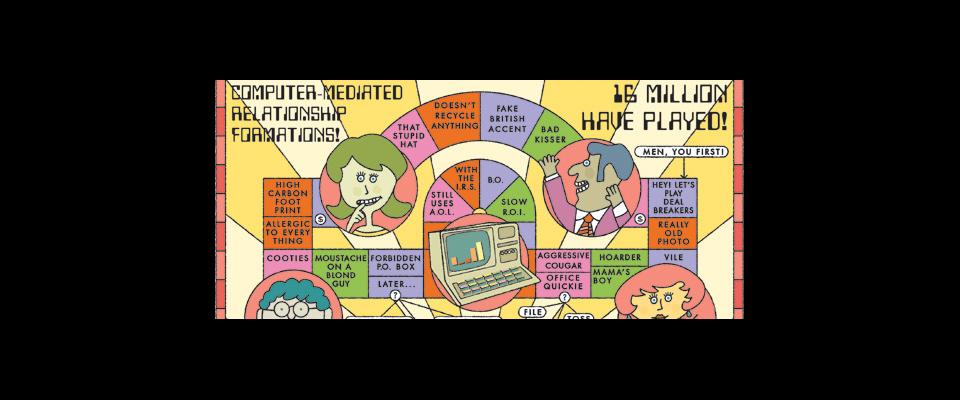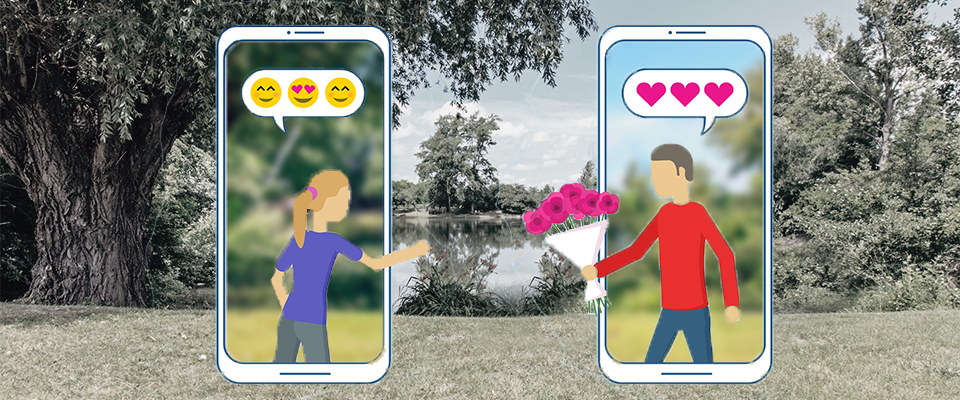People aren’t products. Or are they? We’re in the age of the “personal brand,” after all—where your online persona effects your reputation, the bonds you form with others, your career. And now, your dating life.
Perhaps you’ve heard of Peeple, also known as Yelp for People, where you can rate a human being with a number of stars. And there was once something called the Lulu app, where women could rate men with a series of hashtags so that other women could decide whether to date them. Lulu has since been sold and dismantled, having endured a lot of criticism before its demise.
And now, there’s DatingSphere—a web app created by Ming J. Li , a UC Berkeley alum who majored in political economy and minored in business administration. The app also allows people to rate and review daters, with one main difference: The reviewers are in the daters’ “Sphere of Trust”—which is defined by Li as a group of up to 10 people whom the users choose as reliable judges of character. This includes family, close friends that the daters have known for 2-plus years, and exes they dated for more than one year. Those in the sphere must confirm their identities by becoming a sphere member—which means they must login through Facebook, upload a picture of themselves and the dater together, state how long they’ve known one another, choose personality traits that best represent the dater, validate key information that the user claims to be true, and write a personal story or something most people don’t know about the dater. All of this information is then shared with the dater’s “curated matches,” which are determined based on algorithms that aim to assess compatibility.
The current beta version of the app has 280 users, and DatingSphere is to officially debut later this month as a web accessible only through browsers. Li says he expects to complete IOS and Android platforms by the end of the year.
Why would someone want to use a site that rates and reviews human beings? Because they are seeking an honest portrayal of potential partners—and because four out of five people misrepresent their height, weight, or age on their dating profiles, according to a University of Wisconsin-Madison study. So when most people meet up, they’re usually not what they seem—at least physically.

Dating profiles “are all based on first person perspective, where the user describes themselves or talks about themselves,” Li says. “And they can embellish. They can lie. There’s no verification system, and that’s what I’m hoping to do with the reviews.”
Li recognizes that people could be concerned about a reviewer saying something very negative about them. His Sphere of Trust design reduces that risk, because the reviewers cannot hide behind the shield of anonymity. Also, if something personal is said that the dater doesn’t want revealed, the dater can simply flag the review and DatingSphere will take it down.
But can a curated list of reviewers really provide that much verification?
“Curated public endorsements of a person skew positive and do not tend to reflect an even picture of a person,” says Berkeley School of Information professor Coye Cheshire. “LinkedIn, for example, allows people to endorse people for skills and to write endorsement statements about their experiences working with that person. Obviously, this is great for the person who is looking for a job, but as any hiring manager knows, when everyone looks perfect and has stellar letters of recommendation that only say positive things, we start looking for what is not there: Who didn’t write an endorsement and what might that mean?”
If curated reviews in general aren’t realistic, that could be particularly true when it comes to romantic relationships, as Cheshire makes clear. “Few would provide a well-rounded, realistic review that says, ‘Yeah, Chris is really a great person and a ton of fun to hang out with! He did break his college girlfriend’s heart when he cheated on her, but that was years ago.’”
Cheshire notes that endorsements could be a positive addition to online dating, but curated endorsements or reviews are still just another way to self-present.
Li argues that they still provide more information that daters wouldn’t have otherwise. “I mean, if you look at reviews for products or services, you have to take everything with a grain of salt,” he says, “but that information is still valuable because they help you make your own decision.”
All that aside, it could be weird to approach someone to review your dateability.
Cheshire gives a hypothetical example of a dater’s mother meeting his or her potential partner face-to-face—and how in that situation it may be endearing for her to casually reference embarrassing stories of childhood to her spawn’s date. But if a user had his mother reviewing him or her on a dating profile, that social interpretation could be much less flattering.
Li insists that the stigma surrounding online dating is dissipating as dating sites become more normalized, particularly among those in their 20s and 30s, which is DatingSphere’s target age group.

“If we tried to do what DatingSphere is doing now five or three years ago, it would never have worked because online dating had this stigma where you wouldn’t have asked your friends, family or whatever, for a review,” he acknowledges. “You wouldn’t even want them to know you were on a dating site.”
The goal of the app, according to Li, is to give people a platform to better understand themselves through the observed personality traits of people who know them the best. By understanding a personality through observation, we can get down “to the root of someone’s behavior,” which will help better match someone with a good mate.
But the Internet may not be the best place to get to know yourself and self-reflect, or to let someone else opine about your personal life.
The effects of sharing positive or negative experiences about someone else to an unknown public are vast and it could go badly. Granted, DatingSphere doesn’t show everything in the sphere reviews to everyone on the app—only the curated matches—but those matches are still strangers.
“This creates a potentially problematic market incentive to only have the most positive endorsements because any negative could be seen as disproportionately salient, even if it is not,” Chesire says. He cites the long history of research on the reputation system of the online action/retail site eBay and the perceived power of even one negative rating for sellers.
“The more information that you have, the more you can make the better decision,” says Li. “You have dating sites like Tinder and Bumble where there’s hardly any information and there’s just a picture, because that’s all you can really go off of.”
But it could actually be that people are interested in pictures and physical representation first and foremost. Though the aim of DatingSphere is to be more “meaningful,” people may not care that much about written content on dating profiles.
In a 2012 study, Cheshire assessed the factors that affect relationship longevity of those who meet online, finding that physical attractiveness is one of the most important traits determining initial attraction online and whether or not the users will meet up. Of course, the study also found that appearance, though important at the start, didn’t actually determine how long the relationship would last—meaning that people aren’t ultimately as shallow as they would appear to be at first. So that’s nice.




















